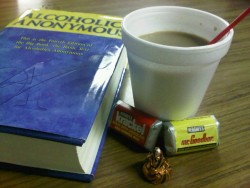Preparing for Your First 12 Step Meeting
Since the 1930s 12 step programs have been a big part of addiction recovery. These meetings provide a sense of community and mutual support. Many people suffering from addiction are anxious, unbalanced, and generally frightened by the prospect of living without their addiction. Walking into a room of people in this condition can be a daunting task. There are a few things that you can do to prepare for your first 12 step meeting to help you get over these initial anxieties.
We can help you find treatment for addiction. Call 800-781-0748 (Who Answers?) toll free anytime.
Common Fears When Starting a 12 Step Program
The first thing to know when preparing to start a 12 step program is the common fears and anxieties associated with it. These are:
- The fear of being recognized or of someone finding out about the addiction,
- The fear of having to admit a problem, or talk about addiction,
- The fear of being forced to participate in “group hugs” or have physical contact with others,
- The fear of having to believe in God, pray, or join a religious organization or cult, and
- A general fear of the unknown.

Meetings are casual, inviting places where people share their experiences.
Any individual may have their own particular fears or anxieties in addition to these, but these are the main ones. With a little more knowledge about the methods and tenets of 12 step programs, many of these fears and anxieties can be lessened. The knowledge necessary to combat the fears associated with starting a 12 step program include:
- The types of meetings,
- The twelve steps and twelve traditions, and
- Where to find information about a meeting that suits your needs.
Types of Meetings in 12 Step Recovery Programs
There are three basic types of 12 step meetings available. These are:
- Step or “Big Book” meetings– These involve a reading from the “Big Book of Alcoholics Anonymous” (the AA manual) or the “Twelve and Twelve” (a book listing the 12 steps and 12 traditions) that is studied and discussed.
- Discussion meetings– In this type of meeting the leader of the meeting starts a discussion related to addiction, and the other attendees add to it, for the sake of perspective.
- Speaker meetings– These meetings have a designated speaker who either volunteers, or is selected in advance and consents, to telling their story of addiction and recovery. There is usually a discussion period afterwards.
In all of these types of meetings, people speaking are encouraged to be brief and focus on their feelings as related to their addiction. Also, there is no interrupting allowed, and no one is to tell another person what they should or should not do. There are no sign-ins, no one takes attendance, and active participation is entirely voluntary.
The 12 Steps and 12 Traditions
After knowing the types of meetings available, the next thing to know are the 12 steps and 12 traditions. The 12 steps are the procedure for completing a 12 step recovery program. When all of the steps are worked in order, there is a significantly high rate of success. According to Narcotics Anonymous, these are the 12 steps:
- Admitting you have a problem.
- Believing in a “higher power” that can help you.
- Giving control of your life over to that “higher power”.
- Conducting a moral inventory.
- Admitting to yourself, your higher power, and one other person all of your transgressions as relates to your addiction.
- Letting go of the guilt relating to these transgressions, and allowing yourself to change.
- Seeking healing and inner peace from your “higher power” through prayer or meditation.
- Making a list of all of the people that your addiction hurt.
- Making amends, if possible, to all of the people on your list.
- Continue evaluating your moral character, and promptly admitting shortcomings.
- Continue to meditate or pray in order to better understand your “higher power”.
- Giving back, and living to provide an example of hope and recovery.
The 12 traditions are the basic operating rules for 12 step programs. The twelve traditions are:
- The welfare of the group comes first.
- The “higher power” is the only authority. No member is in charge.
- The only requirement to join is the desire to quit using.
- Each group is autonomous, except where their actions affect the organization as a whole, or other groups.
- The only purpose of the groups is to spread the message of the 12 steps.
- No group may officially or financially support any person or organization.
- Each group is self-sustaining, and may not accept outside donations.
- The groups and organization are to remain nonprofessional, but may hire specialists as required.
- The groups and organization have no official structure, but may form committees when necessary.
- The organization may never have an opinion on outside issues.
- The organization and its groups may not advertise publicly.
- All persons involved in the groups are to remain anonymous, and protect the anonymity of other members.
Knowing these things helps to eliminate many of the fears and anxieties that go along with attending your first 12 step meeting. There is only one thing left to know: where to find a meeting.
Call 800-781-0748 (Who Answers?) toll free anytime for help finding treatment for addiction.
Finding a Meeting
The first step to working a 12 step program is to find a meeting. Finding a beginners meeting is a good way to learn the structure of the 12 step process in a setting that has other people new to the experience.
Looking in the phonebook under Alcoholics Anonymous or Narcotics Anonymous will yield a phone number for the local AA or NA central chapter. This information can also be found on the websites of these organizations.